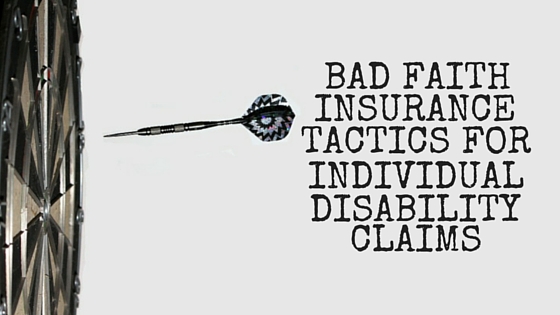Bad Faith Insurance Tactics For Individual Disability Claims

When you purchase disability insurance, you expect the insurance company to act in good faith if and when you need to file a claim. Unfortunately, insurance companies are not in the business of paying every claim they receive or paying all claims in a timely manner. Instead, they may resort to bad faith tactics in hopes of avoiding a payout altogether.
Learn about the most common types of bad faith denial strategies and what to do if you’re on the receiving end.
What is bad faith?
Your policy with the insurance company is a contract agreeing to provide a benefit in exchange for your rich premium payment. This contract is made in good faith, meaning both parties agree at the outset to fulfill their obligations.
If you have presented a legitimate disability claim and your benefits have been unreasonably delayed or wrongfully denied, this is considered bad faith.
Common bad faith tactics
- Discouraging the policyholder by slow paying or delaying the payment of benefits
- Failing to fully and fairly investigate claims in a timely manner with an eye towards payment
- Using an improper or hidden denial standard to deny a claim
- Putting the company’s financial interests ahead of its policyholders’ rights
- Using harassment or “beating down” the claimant’s strategy to keep a claim from being paid
- Requiring excessive or unnecessary claim information
- Using abusive or coercive tactics to settle or whittle down a legitimate claim
- Failing to explain each and every applicable policy exclusions or provisions
- Intimidating or misinforming a policyholder of their rights under their policy
What you can do about it
If your insurance company has acted in bad faith, don’t ever let them get away with it. You can – and should – take legal action to recover the benefits that are rightfully yours.
An insurance company that acts in bad faith may be liable for additional damages, such as:
- All of the contract damages
- Emotional distress
- Extra-contractual damages for stained credit, bankruptcies or repossessions
- Punitive damages
- Recovery of attorney’s fees
However, many claimants miss the opportunity to recover these damages because they don’t realize they have a bad faith claim. An experienced bad faith disability insurance attorney can help you determine what legal recourse you may have.
Look for a Seattle disability attorney who is familiar with the subtleties in the application process, policy restrictions, exclusions and limitations, and common claims delay and bad faith denial strategies.



